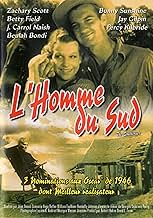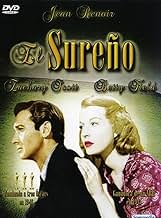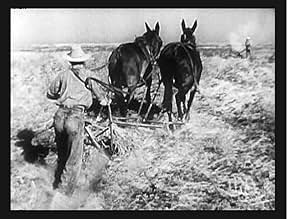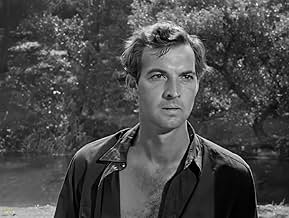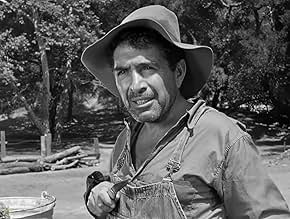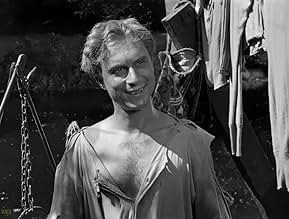VALUTAZIONE IMDb
7,1/10
4162
LA TUA VALUTAZIONE
La storia di Sam Tuker, contadino del Tennessee che decide di diventare coltivatore diretto di cotone invece che lavorare sotto padrone, ma deve vedersela con le calamità naturali e le mesch... Leggi tuttoLa storia di Sam Tuker, contadino del Tennessee che decide di diventare coltivatore diretto di cotone invece che lavorare sotto padrone, ma deve vedersela con le calamità naturali e le meschinità e gli egoismi dei vicini.La storia di Sam Tuker, contadino del Tennessee che decide di diventare coltivatore diretto di cotone invece che lavorare sotto padrone, ma deve vedersela con le calamità naturali e le meschinità e gli egoismi dei vicini.
- Regia
- Sceneggiatura
- Star
- Candidato a 3 Oscar
- 3 vittorie e 3 candidature totali
Paul E. Burns
- Uncle Pete
- (as Paul Burns)
Audley Anderson
- Townsman
- (non citato nei titoli originali)
Rudy Bowman
- Townsman
- (non citato nei titoli originali)
Recensioni in evidenza
The opening shot amounts to a wonderfully compelling hymnal to the land and those who toil there, while the rest of the movie attempts to follow through with that noble theme. There's no doubt that this is one of the most laudable movie projects to come out of the decade. But for all the earnest concern, there's still too much of the theatrical for my liking. I know, the film is generally hailed by critics, and there's much to be said for its consistent down-and-dirty look at the plight of the southern share-cropper. But there's also a staginess to many of the characters and scenes that blemishes director Renoir's naturalistic approach.
Consider Beulah Bondi's over-the-top turn as Granny. She's supposed to offer amusingly caustic comments on events as relief from the rigors of the plot. The trouble is that both she and the camera rub our nose in the role. They just as well have hung a sign around her neck saying "crusty old woman". The bad make-up job doesn't help either and serves as a constant reminder that the Tuckers are after all only a make-believe family. Since she's a central character, the flaws in her wild eye-rolling performance are hard to ignore.
The other acting is fine, especially from Scott in the lead role as Sam. However, both he and wife Nona (Field) are more stereotypes than multi-dimensional people. He's the noble, tireless worker, and so is she. Together, they are unwavering in their support of each other and the farm. And when Sam does waver after the flood, it's Nona providing the strength to persevere. Thus, it's the whole family and not just Sam plowing the field that will make the farm a success. That's a good point for the script to make. The trouble is that Sam and Nona are simply too good to be believable in the face of all the adversity. At least one breakdown scene where the emotional toll of the wrenching burdens is expressed would have added a more human dimension. Writer Renoir is simply too insistent on the nobility of the two characters, turning them more into symbols than complex real people.
On the other hand, the hostile neighbor Devers (Naish) is the most interesting of the characters. His dark resentful nature would appear to come from uncredited co-writer William Faulkner who specialized in such Gothic personalities. The real agonizing story of what it means to start up a farm is told by the embittered old man in what I take to be the movie's central scene. He's made a success, but that success has made him hard and mean, and now he lives in fear of anyone rising above him. I wish the screenplay had not betrayed that dark impact for the price of a big fish in what strikes me as a very implausible turn- around scene on the riverbank.
The film's virtues are pretty obvious. There's a real effort at showing rural poverty and its effects on people, never a Hollywood biggie. When little Daisy lovingly puts on the crude blanket-coat, I was reminded of a world so easily passed over in a nation of commercialized malls. Ditto the well-done possum feast, where the simple act of eating means so much more. And especially when the family and we gather around the little hearth fire to peer into the glow through eyes much more ancient than our own. These are indelible scenes that transcend the movie screen and alone are worth the price of the movie.
Maybe it took a European auteur outside the usual studio framework to want to deal as honestly as possible with such a non-commercial theme. But the location shooting and insistence on the unglamorous, even down to the very unHollywood barfly, add up to what looks like an effort at honest depiction. Of course, Renoir's well-known humanism and rollicking humor show up in the party scene in what amounts to a folk celebration of life and community. Then too, there's that telling scene between Sam and Tim (Kemper) where each comes to appreciate the contributions of the other in supplying the community's needs. Whatever the film's regrettable flaws, the message remains a powerful one that needs constant retelling, especially in our own cynical times. Too bad Renoir didn't stay on this side of the Atlantic. His influence on our own movie-makers would have pushed them in a much needed direction.
Consider Beulah Bondi's over-the-top turn as Granny. She's supposed to offer amusingly caustic comments on events as relief from the rigors of the plot. The trouble is that both she and the camera rub our nose in the role. They just as well have hung a sign around her neck saying "crusty old woman". The bad make-up job doesn't help either and serves as a constant reminder that the Tuckers are after all only a make-believe family. Since she's a central character, the flaws in her wild eye-rolling performance are hard to ignore.
The other acting is fine, especially from Scott in the lead role as Sam. However, both he and wife Nona (Field) are more stereotypes than multi-dimensional people. He's the noble, tireless worker, and so is she. Together, they are unwavering in their support of each other and the farm. And when Sam does waver after the flood, it's Nona providing the strength to persevere. Thus, it's the whole family and not just Sam plowing the field that will make the farm a success. That's a good point for the script to make. The trouble is that Sam and Nona are simply too good to be believable in the face of all the adversity. At least one breakdown scene where the emotional toll of the wrenching burdens is expressed would have added a more human dimension. Writer Renoir is simply too insistent on the nobility of the two characters, turning them more into symbols than complex real people.
On the other hand, the hostile neighbor Devers (Naish) is the most interesting of the characters. His dark resentful nature would appear to come from uncredited co-writer William Faulkner who specialized in such Gothic personalities. The real agonizing story of what it means to start up a farm is told by the embittered old man in what I take to be the movie's central scene. He's made a success, but that success has made him hard and mean, and now he lives in fear of anyone rising above him. I wish the screenplay had not betrayed that dark impact for the price of a big fish in what strikes me as a very implausible turn- around scene on the riverbank.
The film's virtues are pretty obvious. There's a real effort at showing rural poverty and its effects on people, never a Hollywood biggie. When little Daisy lovingly puts on the crude blanket-coat, I was reminded of a world so easily passed over in a nation of commercialized malls. Ditto the well-done possum feast, where the simple act of eating means so much more. And especially when the family and we gather around the little hearth fire to peer into the glow through eyes much more ancient than our own. These are indelible scenes that transcend the movie screen and alone are worth the price of the movie.
Maybe it took a European auteur outside the usual studio framework to want to deal as honestly as possible with such a non-commercial theme. But the location shooting and insistence on the unglamorous, even down to the very unHollywood barfly, add up to what looks like an effort at honest depiction. Of course, Renoir's well-known humanism and rollicking humor show up in the party scene in what amounts to a folk celebration of life and community. Then too, there's that telling scene between Sam and Tim (Kemper) where each comes to appreciate the contributions of the other in supplying the community's needs. Whatever the film's regrettable flaws, the message remains a powerful one that needs constant retelling, especially in our own cynical times. Too bad Renoir didn't stay on this side of the Atlantic. His influence on our own movie-makers would have pushed them in a much needed direction.
Renoir was still a master and had definitely not lost his touch when he made this saga about a year in the life of a desperately poor farming family trying to make it. The only thing that mars it, keeping it from rating a 10, are the cutesy-poo children and the saccharine music on the soundtrack, making it perfectly clear exactly how you were supposed to feel at any given moment. I suppose these were necessary nods to Hollywood conventions of the time. Kudos must go to Zachary Scott for the courage of his performance in the lead. An underrated actor, Scott was nearly always cast playing lounge lizards and other assorted slimeballs. Here he appears without his mustache and is almost unrecognizable. Given that Scott aspired to a career as a Gable-type leading man, this role was not a good career move. But it is definitely the performance of his career, and along with the equally outstanding performance of Betty Field, makes the film. Incidentally, I could have done without the over the top performance of Beulah Bondi as Granny; throughout the film I kept hoping Scott would strangle her.
I saw this film on a Saturday morning and loved it. It's about a man, his wife, their two children and the grouchy grandma, who are dirt poor (and I mean that literally) farmers. It's based on the book by George Sessions Perry called "Hold Autumn in Your Hand," but the movie and the book are completely different in style and manner. I personally like the movie more, as it showed the family's togetherness much better than the book. A wonderful Renoir film (I think my favourite of all his) and definitely a must see. The courage of the family is really touching. I gave it a...10/10.
THE SOUTHERNER is notable for giving ZACHARY SCOTT his first real chance to shine as a promising new movie actor headed for stardom, teaming him with the always reliable BETTY FIELD as the wife of a dirt poor farmer in this Depression-era saga, uplifting despite the adversity of their situation due to Jean Renoir's fine direction.
"Grow your own crop," Scott, a Texas farmer, is told by his dying uncle. He struggles with his family to do just that--and THE SOUTHERNER becomes a tale of survival against the cruel twists and turns of nature. BEULAH BONDI is the stubborn Granny whose bark is worse than her bite, but she does tend to get annoying in her whining ways.
Working the land and making farmland self-supporting is never an easy matter and it gets plenty of negative treatment here with the odds against the struggling family at every turn. J. CARROLL NAISH and NORMAN LLOYD as hard-nosed neighbors make themselves utterly unlikeable (but believable) as Scott's uncooperative neighbors, unwilling to spare some milk for him when his son is ill. PERCY KILBRIDE comes to his rescue with a rented cow and later becomes his father-in-law, marrying BLANCHE YURKA.
But there are still hardships ahead, including a severe storm that destroys all the crops, serving to emphasize the man against nature theme of the entire story. Everything is destroyed but the human spirit.
Scott, Field and Bondi give heartfelt performances, with Bondi a bit over-the-top as Granny. It's not in the same class with THE GRAPES OF WRATH but it does create a sympathetic portrait of farmers who work the land.
Based on a novel called "Hold Autumn in Your Hand", it stands the test of time largely because of the performances.
"Grow your own crop," Scott, a Texas farmer, is told by his dying uncle. He struggles with his family to do just that--and THE SOUTHERNER becomes a tale of survival against the cruel twists and turns of nature. BEULAH BONDI is the stubborn Granny whose bark is worse than her bite, but she does tend to get annoying in her whining ways.
Working the land and making farmland self-supporting is never an easy matter and it gets plenty of negative treatment here with the odds against the struggling family at every turn. J. CARROLL NAISH and NORMAN LLOYD as hard-nosed neighbors make themselves utterly unlikeable (but believable) as Scott's uncooperative neighbors, unwilling to spare some milk for him when his son is ill. PERCY KILBRIDE comes to his rescue with a rented cow and later becomes his father-in-law, marrying BLANCHE YURKA.
But there are still hardships ahead, including a severe storm that destroys all the crops, serving to emphasize the man against nature theme of the entire story. Everything is destroyed but the human spirit.
Scott, Field and Bondi give heartfelt performances, with Bondi a bit over-the-top as Granny. It's not in the same class with THE GRAPES OF WRATH but it does create a sympathetic portrait of farmers who work the land.
Based on a novel called "Hold Autumn in Your Hand", it stands the test of time largely because of the performances.
Beautifully shot, absorbing film about the close-knit Tucker clan - Sam (Zachary Scott), the handsome dad who loves being a farmer, Nona (Betty Field), a good wife and mother who always seems to look well-groomed in spite of her hard work, two really cute kids, and then there's ornery old Granny (Beulah Bondi), she of the sharp tongue and stubborn will. In a gorgeously photographed scene where they are working for hire in the bright, sunlit fields picking cotton - the couple watches as their Uncle dies in the fields saying in his last breath "Grow your own crops", and they decide to do just that. Soon they have rented a property where they can raise cotton and be their own masters, so to speak - well, the house turns out to be nothing but a broken-down, ramshackle shack, the whole place needs loads and loads of work - but one good thing" it has "good earth". Troubles ensue - trouble with the neighbors, trouble getting food, sickness troubles, weather troubles, oh brother!
Well, this is an excellent, heartfelt, and well photographed film done in an unusual, distinctive style. The actors who play the Tucker family do a good job in making this actually seem like a real family and make you want to root for them - but it is Beulah Bondi as cantankerous Granny who really steals this film for me - I really enjoyed her scenes and thought they added a little spice to this! The hardships this clan has to go through can be hard to watch sometimes, but the story is involving and the film is quite memorable.
Well, this is an excellent, heartfelt, and well photographed film done in an unusual, distinctive style. The actors who play the Tucker family do a good job in making this actually seem like a real family and make you want to root for them - but it is Beulah Bondi as cantankerous Granny who really steals this film for me - I really enjoyed her scenes and thought they added a little spice to this! The hardships this clan has to go through can be hard to watch sometimes, but the story is involving and the film is quite memorable.
Lo sapevi?
- QuizBased on the novel "Hold Autumn in your Hand", by George Sessions Perry, which won the first National Book Award in 1941.
- BlooperWhen Finley whipped the cows the dog disappeared for a second Indicating a film cut.
- ConnessioniEdited into 365 days, also known as a Year (2019)
I più visti
Accedi per valutare e creare un elenco di titoli salvati per ottenere consigli personalizzati
- How long is The Southerner?Powered by Alexa
Dettagli
Botteghino
- Budget
- 750.000 USD (previsto)
- Tempo di esecuzione
- 1h 32min(92 min)
- Colore
- Proporzioni
- 1.37 : 1
Contribuisci a questa pagina
Suggerisci una modifica o aggiungi i contenuti mancanti



